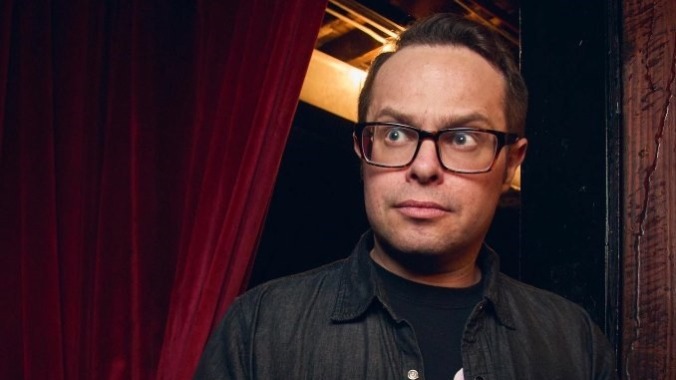John F. O’Donnell Is on Lithium and Proud in His New Stand-up Special

When I first saw comedian John F. O’Donnell perform at the Tiny Cupboard in Brooklyn, he commanded the audience’s attention from the outset with his energetic delivery. For those unfamiliar with his work, he surprised with his candid content on living with bipolar I disorder and finding the absurdity and humor in his manic episodes. The audience effortlessly laughed along with O’Donnell, and his expert comedic timing almost obscured the fact that it takes tremendous vulnerability to speak about such a stigmatized illness publicly. For the 2.8% of adults in the U.S. who live with bipolar disorder it’s common to be the butt of a joke, but rare to have people laughing on your own terms.
In his stand-up special I’M ON LITHIUM, O’Donnell shares his experience with a major manic episode in 2008 where he finds himself in prison, on comedy stages, and in the streets of Ireland. He points out the moments where people could have provided him with the help he needed, but instead directed him to the next step in a highly destructive journey. While we laugh with O’Donnell on his way to eventually receiving help, at times he speaks seriously about the stakes of being unwell and the importance of being in treatment. In this interview with Paste, O’Donnell talks about how he got to a place where he could tell jokes about this experience and what he’s learned since.
Paste Magazine: I first wanted to start by asking about the title. I’M ON LITHIUM really sounds like a declaration, and you put it in all caps. Can you talk about where the title came from?
John F. O’Donnell: I think it came from me taking so long to kind of get with the program to make my mental health central to my life. I wasn’t medication compliant for a really long time. I had so much self stigma about so many aspects of the illness, including having to be on medication. So I think it’s just me owning it. And there’s another aspect of it, where I wasn’t prescribed lithium until 14 years into my illness, because it really went out of favor for being given as a treatment for bipolar I disorder, because the pharmaceutical industry was pushing all sorts of other medications, like atypical antipsychotics and newer mood stabilizers. All these years later, they’ve come back and said, yet again, that lithium is the gold standard treatment for bipolar I disorder. So part of me calling it that is also a shout out to the fact that I wasn’t prescribed the actual medication that is the cornerstone of what works for me for 14 years. Not that I would have been medication compliant from the start, I certainly don’t think that I would have, but it would have been nice not to have just been on all of this other stuff.
Paste: You said in your special that you couldn’t say you had a mental illness out loud without crying for years. What became the point where you could laugh at your manic episode and when did you feel confident turning this traumatic situation into comedy?
O’Donnell: When I had such an epic manic episode in 2008 in New York City, a nightmare of mine came true, that I would have a very public and explosive manic episode after already having established myself and my reputation in the New York City comedy scene. The episode lasted for eight months, and it was incredibly rough. I burned so many bridges. I alienated myself from so many people. I ended up in the hospital for two and a half months. I spent another nine months depressed and I finally came back to the scene in the fall of 2009, and I decided that I was going to address everything that happened head on. I wasn’t going to brush one speck of dirt underneath the carpet, because I didn’t want people to perceive me as a pitiable, broken person. So I decided to dig deep and make very personal and painful things funny, and that’s when I began to talk about my experience with bipolar disorder publicly through my standup and on podcasts. It began the process of me being able to laugh at all of this pain and insanity, and I’ve been doing that for 14 years.
Paste: When you made your special, I’M ON LITHIUM, who were you thinking about in terms of audience?
-

-

-

-

-

-

-

-

-

-

-

-

-

-

-

-

-

-

-

-

-

-

-

-

-

-

-

-

-

-

-

-

-

-

-

-

-

-

-

-








































